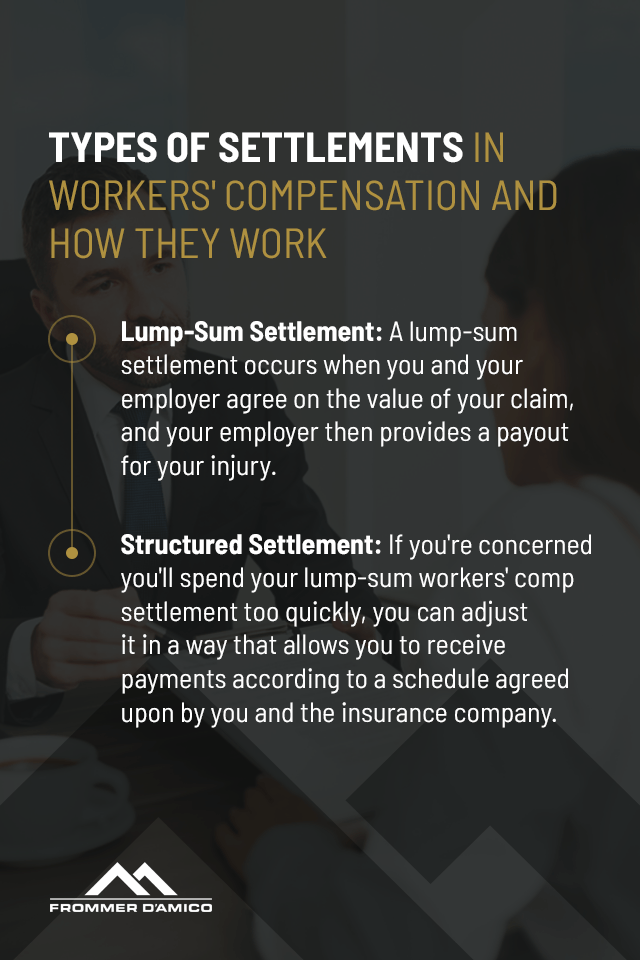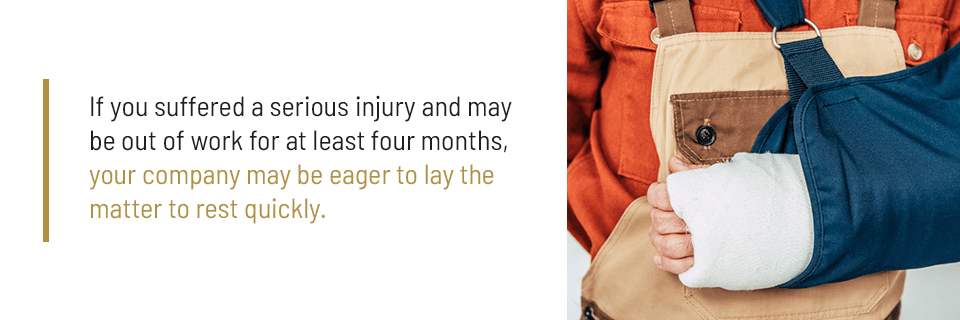Table of Contents
“I got hurt at work, will I get a settlement?” If you’ve been in a workplace accident that results in an injury or illness, you may be eligible for workers’ compensation benefits. Workers’ compensation is benefits paid by private insurance companies that you receive for lost wages, medical care and specific loss benefits, such as hearing or sight loss. Workers’ comp helps you protect yourself financially if you are unable to work due to your injuries.
While some people wish to pursue ongoing medical coverage and wage compensation until their injury is resolved, others opt for a workers’ compensation settlement. In Pennsylvania, this one-time arrangement settles your workers’ compensation claim with your employer or insurance provider in exchange for a once-off payment or structured settlement.
Worker’s comp is designed to help you and your loved ones avoid a financial catastrophe if an injury or illness prevents you from earning a living. Sometimes, it may make more sense for you, your employer and their insurance to pursue a workmans comp settlement. Let’s break down what you need to know about the average workers’ comp settlement in Pennsylvania, what influences payout amount, and how the process works.
What Is an Offered Workers’ Comp Settlement?
Pennsylvania law requires most employers to carry workers’ compensation insurance. You can file a claim on your employer’s insurance policy when you’re injured on the job. In some cases, injured workers receive a settlement offer.
A settlement offer is when an employer or insurer offers compensation to resolve a workers’ comp claim. You can decide whether or not to accept the offer. You can also negotiate a settlement.
Not every worker gets a settlement offer, but when there is a permanent injury, and it makes sense for both the employer and the employee, you may negotiate one between yourself, your employer and your employer’s insurance company.
Before your case can be settled, a judge must approve it. The workers’ compensation judge will review the proposed settlement to ensure you understand its terms and legal implications. If the judge approves, you’ll receive your settlement offer. If they don’t, the case will return to negotiations, or any pending litigation will continue.
Please watch this short video to learn more.
An Explanation of Workers’ Compensation for On-The-Job Injuries in PA
If you have been injured at work in Pennsylvania, you can file a claim for workers’ compensation. If your employer accepts your workers’ comp claim, you may receive coverage for all of your related medical expenses and up to two-thirds of your average weekly pay.
The Pennsylvania Workers’ Compensation Act allows for minimum and maximum adjustments, with the annual amounts at the time your injury occurred determining the benefit rate thresholds. These figures are determined by the statewide average weekly wage calculated by the Department of Labor and Industry (DLI).
In 2024, those with average weekly earnings between $993.76 and $1,987.50 are entitled to 66 ⅔% of their actual weekly average up to a maximum of $1,325 weekly. Earners averaging between $736.11 and $993.75 are capped at $662.50 weekly, while those earning less than $736.10 a week can receive no more than 90% of their average as a maximum benefit rate.
The minimum benefit an employee experiencing an on-the-job injury may receive is the lesser of 50% of the DLI’s calculated average weekly wage statewide or 90% of the employee’s actual average weekly earnings.
The Act also allows for “offset credits” against your payments. Additional factors that can impact your benefit include receiving any severance pay, unemployment compensation benefits and employer-funded pension payments at the same time you collect under workers’ compensation claims. Generally speaking, your receipt of any of those other payments listed above would count against your Pennsylvania workers’ comp wage loss payments if those other payments are made at the same time as your workers’ comp payments.
How PA Work Comp Helps Employees and Employers
The Workers’ Compensation Act works for both the injured employee and their employer. Because workers’ comp is a no-fault system, you’re eligible for workers’ comp benefits no matter who is responsible for the injury. This part of the system favors the employee, as they can still receive compensation even if they’re responsible for causing the injury or if there is no fault at all by anyone.
Employers also benefit from the workers’ compensation system because employees are not allowed to sue them for work-related injuries — that means employers can avoid facing an expensive workers’ compensation lawsuit after an employee receives an injury as the result of an employer’s negligence.
Types of Workers’ Comp Payments
Depending on your injury or how long you are out of work as a result of your workplace-related accident or illness, you may qualify for disability benefits in Pennsylvania. The two types of payments you may receive are Temporary Total Disability (TTD) or Permanent Total Disability (PTD):
Temporary Total Disability: You’ll receive TTD payments until you return to work or if you return with workplace restrictions or job modifications.
Permanent Total Disability: If you cannot return to work at all, you may be eligible for PTD payments. These are essentially the same as TTD benefits but paid after you are permanently disabled. You can receive total disability benefits for up to 500 weeks. In some cases, where the injury causes permanent severe impairment, you could receive total disability benefits even beyond 500 weeks.
How a Workers’ Comp Settlement Offer Works in PA
By accepting a settlement, you are making a trade-off. You receive money to help with expenses and avoid any litigation risks from your employer, but you also lose weekly payments and the possibility of long-term compensation. This means that you are unable to file a workers’ comp lawsuit for the same injury in the future.
If you’re unsure whether to accept a settlement offer or make one yourself, discuss your situation with a workers’ compensation lawyer in Pennsylvania. They can help you determine which type of settlement is best for you and what amount you should ask for from an offer.
To understand how a workers’ comp settlement offers works, first, you must know the two types of settlements you may be offered.
Types of Workers’ Compensation Settlements in Pennsylvania
In Pennsylvania, injured workers can receive a settlement in one of two forms — lump-sum or structured. Both types come with their benefits and disadvantages.
Lump-Sum Settlement
A lump-sum settlement occurs when you and your employer agree on the value of your claim, and your employer then provides a payout for your injury in a single transaction. A lump-sum settlement in Pennsylvania — called a Compromise and Release Agreement — must be approved by a Pennsylvania workers’ compensation judge before your employer can pay it.
In return for a lump-sum payout, you can waive rights to future wage loss or medical benefits for your work injury. You may be able to settle only your wage loss claim, only your medical claim or both. If you settle both your wage loss and medical claims, you will be paid the lump-sum amount and no longer receive workers’ comp payments from your employer. If your injury takes longer to heal than expected or becomes worse, you won’t receive any additional compensation.
You may want to consider a lump sum settlement if:
You’ve reached maximum medical improvement (MMI): MMI is when your physician informs you that you’ve healed as much as possible and you’ll see no further recovery. Waiting until you’ve reached MMI will allow you to anticipate your future medical expenses, so payment would be based on permanent disability.
You don’t want to wait: You may also prefer to have the money available now instead of having it paid out over weeks or months. Dealing with the insurance company can sometimes feel like a hassle on top of your recovery.
You feel like insurers are keeping tabs on you: If you do receive a settlement offer, you’ll no longer have to worry about the insurance company keeping tabs on you or trying to prove you’re faking your injury, which can feel invasive and upsetting for many people.
Structured Settlement
Structured settlements occur when payments are spread out over time rather than received at once. You may want to consider a structured settlement if:
You’re concerned you may quickly spend a lump-sum payment and not have enough money to cover all your future expenses.
You’re concerned about the tax implications or the effect on your Social Security Disability Insurance benefits from receiving a lump-sum payment.
If you’re concerned you’ll spend your lump-sum workers’ comp settlement too quickly, you may work with your lawyer to restructure it. You can adjust it in a way that allows you to receive payments according to a schedule agreed upon by you and the insurance company.
If you’re receiving Social Security benefits along with your workers’ compensation benefits, you may also worry about what that could mean for your taxes or the impact of a settlement on your Social Security disability payments. Though workers’ comp benefits are not taxed at the federal or state level, receiving Social Security benefits along with your workers’ comp could create tax problems for you.
Your combined Social Security Disability Insurance and workers’ compensation benefits can’t be more than 80 percent of your pre-injury income. If they are greater than the limit, the Social Security Administration will cut them by the amount above 80 percent. However, you might be taxed on your original total Social Security Disability Insurance benefits, including the amount you’re no longer receiving. If that happens, you will need an accountant to help determine how to handle that situation.
Will I Be Offered a Settlement?
How do you get a settlement from workers’ comp? Receiving workers’ comp benefits does not necessarily mean you will receive a settlement offer. Instead, many other factors affect this decision. Your employer may anticipate a fast return to work or that lighter duties are an alternative, which can influence their potential to make a settlement offer.
You may want to consider a settlement in the following situations when:
You’re tired of waiting for the workers’ compensation process to finish.
Your doctor doesn’t think you’ll recover further.
You’re no longer progressing in your recovery.
You’re in litigation against your employer.
Either you or your employer no longer get along and want to part ways.
Your injury requires you to start over.
You’re worried that you may lose your claim.
When Will I Be Offered a Settlement?
You may receive a settlement offer at any point. Sometimes, companies propose an initial settlement amount when you first make a claim. If you suffered a serious injury and may be out of work for several months, your company may be eager to lay the matter to rest quickly. Other times, it can take longer for an employer to put a settlement on the table. You may fight for months or even a year before you get a settlement offer — every case is different.
So, when will workers’ comp offer a settlement? Overall, the timing may vary. You could be offered a workers’ comp settlement any time during your case, including early on or when filing an appeal. Your lawyer can advise you on timing.
Why Do Employers and Insurers Offer Settlements?
When you file a workers’ comp claim, the employer and insurer will likely attempt to find grounds for denying it. Perhaps you didn’t follow all filing or reporting procedures to the letter, or maybe they’ll try to say your injury wasn’t related to your job.
In other situations, employers and insurers may determine their best recourse is to offer you a lump-sum cash amount to settle your claim.
Upon first inspection, a settlement from workers’ compensation insurance might seem like a financial windfall, especially if the amount reaches six figures. In truth, the insurer is probably offering you a settlement to mitigate its costs.
A settlement may help an employer save money over time. If your employer fights against your claim and wins the case during a hearing in front of a workers’ compensation judge, then they may no longer have to continue paying your workers’ compensation. If your employer fights against you and loses, however, they lose money from the expenses leading up to the hearing and from your workers’ comp benefits afterward. Settling your workers’ compensation case is often better for the employer’s long-term finances.
How to Win a Workers’ Compensation Settlement
If you want to win a workers’ compensation settlement or renegotiate its terms, your first step should be to retain a workers’ compensation attorney to obtain the best outcome in your case.
Working with an experienced attorney is especially important in some cases to help protect your legal rights as an employee. If you’ve experienced any of the following situations, reach out to a certified workers’ comp lawyer right away regarding any of these important issue that may directly impact your case and settlement potential:
Your employer or their insurance company has denied your claim.
You have been given or are likely to have permanent work restrictions.
You’ll reach Medicare eligibility within 30 months.
Your symptoms significantly change.
You’ve been asked to submit to an independent medical examination (IME).
You distrust the health care providers your employer has chosen as preferred doctors for your initial evaluation.
When you work with an attorney, you have an advocate who is familiar with the system and the tactics insurance companies and employers use to take advantage of it. A lawyer can help you navigate the complexities and estimate how much a fair amount is for your settlement to ensure you get the full compensation you’re entitled to. Plus, experienced workers’ compensation lawyers are skilled negotiators who can help maximize the settlement amount you receive.
What Is a Fair Amount For a Workers’ Compensation Settlement?
What you receive from your settlement depends on the specific circumstances of your situation.
If you receive a workers’ compensation offer of settlement, the first thing you should do is contact an experienced workers’ comp attorney. Your attorney will have the expertise to evaluate the offer and determine its fairness based on your situation. This entails determining the expected costs of ongoing medical treatment and the amount of lost wages you may need to recapture over time.
In the typical workers’ comp settlement, amounts originate from two-thirds of your average weekly pay and the 500 weeks that injured workers in Pennsylvania are eligible for benefits. If two-thirds of your average weekly pay was $500, then you’ll multiply $500 by 500 weeks for a total of $250,000.
You aren’t likely to receive this entire amount because your employer or their attorneys will not likely agree with your evaluation if they feel that they can prove that you have the ability to work or will recover from the injury. So that’s why there are negotiations to determine if an agreement can be reached to settle based upon those factors and a fair settlement amount. If you have ongoing medical treatment, you’ll also have to account for medical expenses.
Factors That Influence Settlement Amounts
The exact amount you can expect to be offered in a workers’ comp settlement depends on a variety of factors. This includes:
Impairment rating: This percentage represents the extent to which you are impaired or impacted by an injury or illness has impaired or impacted you.
Injury severity: Have you lost use of a body part? Are you likely to heal or make a full recovery? Some injuries and illnesses are more severe than others.
Timeliness of claim: The clock begins to count down the moment you are injured. In Pennsylvania, you have 120 days to submit your claim.
Medical costs: The amount you spend on medical expenses is another factor that is taken into account during settlement negotiations.
Your average weekly wages: Your average pre-injury earnings also determine the benefits you receive.
Another important factor in settlement amounts is the power of negotiations between you, your attorney, your employer or their insurance company. How these talks progress can influence the outcome sum.
PA Workers’ Comp Settlement Limits
The amount an employee can expect to receive in a settlement is limited by the amount that an Employer believes it may pay out over time. However, there is no specific dollar limit. Your claim may be work much more if you can never work again or have significant work restriction.
Average Workers’ Comp Settlement in Pennsylvania
To get an idea of an average workers’ comp settlement you may receive in Pennsylvania, you can check out our case results. These vary based on the type, scope, required treatment and duration of injuries involved. For lower back injuries, our clients have received award amounts ranging from $52,000 to $439,677.
Should I Accept a Settlement?
What should you do when you receive a workers’ compensation settlement offer? While a workers’ compensation lawsuit can help you secure fair compensation, it may involve a longer legal process compared to accepting a settlement. Consulting with an experienced attorney can help you weigh your options to and decide on the best course of action. Ultimately, the answer lies in your circumstances and what might improve or not improve by taking the offer.
You may want to take the offer if your recovery is on hold and your health is not improving. You may wish to accept a settlement if you want to move on from a workers’ comp case. You may prefer a settlement to the hassles and uncertainties of litigation that often occur in Pennsylvania workers’ comp cases. You should consider these factors before making your decision:
Will you need more surgery?
Does the settlement provide enough for financial peace of mind?
How challenging is it to deal with the insurance company?
Will you be out of work for months or years?
What Happens If I Settle?
When you accept a workers’ comp settlement, you receive a one-time lump-sum payment. That means you won’t get any more money from your employer for this injury. You waive your rights to any future claims, which is why Pennsylvania and other states make a judge look over the case to ensure your understanding.
If you need another surgery after you accept the deal, you can’t get compensation for it from your employer. Ideally, the settlement will give you financial security. Think about it before you accept any deal. Better yet, consult a lawyer to discuss the merits of the offer and what it would mean for you down the road.
Who Pays the Workers’ Comp Settlement?
Just as you take out insurance policies to cover your home, car or life, your employer carries insurance to pay for workers’ compensation claims. If you’ve ever had an auto accident and filed a claim with your insurance company, you may have experienced a subsequent increase in your premium.
A claim represents an expense to an insurance company, so they attempt to recover that cost by raising premiums for claim filers. Similarly, a workers’ comp claim creates an expense for the insurance provider, which they often pass on to the company in the form of higher costs.
Contact Frommer D’Amico for Help With Your Settlement
If you’ve received a workers’ comp settlement offer in Pennsylvania, contact Frommer D’Amico today to schedule a no-obligation initial consultation. You can also call us at 717-400-1405 to speak to a workers’ comp attorney.
Our team of attorneys consists of certified workers’ compensation experts who can review your situation and help you determine whether you should accept the offer or pursue further legal action. Our attorneys only represent injured employees — never the employers or insurance companies. We offer low fees and can come right to your location for an appointment.

Joe D’Amico has more than 20 years of experience fighting for injured workers. He is Certified as an Expert in Pennsylvania Workers’ Compensation Law by the Supreme Court of Pennsylvania. Joe is one of the very few Pennsylvania workers’ compensation attorneys who have obtained a recovery in excess of $1.5 million for an injured worker.
Reviewed by Joe D’Amico.





